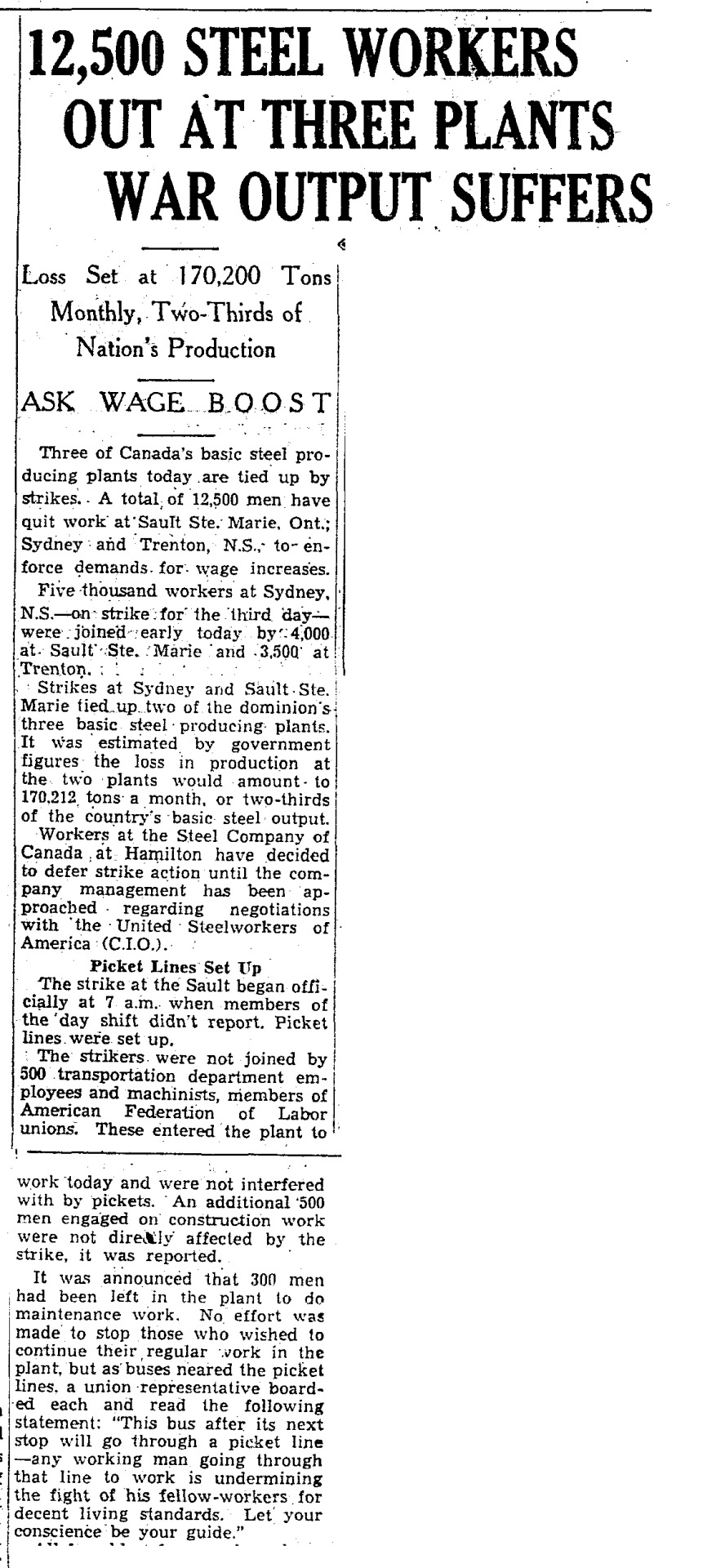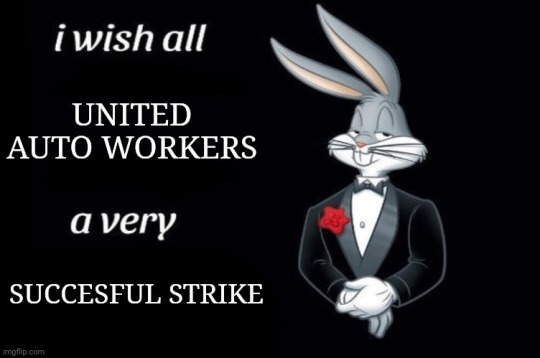#wage demands
Explore tagged Tumblr posts
Text

"12,500 STEEL WORKERS OUT AT THREE PLANTS; WAR OUTPUT SUFFERS," Toronto Star. January 14, 1943. Page 1. ---- Loss Set at 170,200 Tons Monthly, Two-Thirds of Nation's Production ---- ASK WAGE BOOST ---- Three of Canada's basic steel producing plants today are tied up by strikes. A total of 12,500 men have quit work at Sault Ste. Marie, Ont.; Sydney and Trenton, N.S., to enforce demands for wage increases.
Five thousand workers at Sydney, N.S. - on strike for the third day - were joined early today by 4,000 at Sault Ste. Marie and 3,500 at Trenton.
Strikes at Sydney and Sault Ste. Marie tied up two of the dominion's three basic steel producing plants. It was estimated by government figures the loss in production at the two plants would amount to; 170,212 tons a month, or two-thirds of the country's basic steel output.
Workers at the Steel Company of Canada at Hamilton have decided to defer strike action until the company management has been approached regarding negotiations with the United Steelworkers of America (C.I.O.).
Picket Lines Set Up The strike at the Sault began officially at 7 a.m. when members of the day shift didn't report. Picket lines were set up.
The strikers were not joined by 500 transportation department employees and machinists, members of American Federation of Labor unions. These entered the plant to work today and were not interfered with by pickets. An additional 500 men engaged on construction work were not direly affected by the strike, it was reported.
It was announced that 300 men had been left in the plant to do maintenance work. No effort was made to stop those who wished to continue their regular work in the plant, but as buses neared the picket lines, a union representative boarded each and read the following statement: "This bus after its next stop will go through a picket line - any working man going through that line to work is undermining the fight of his fellow-workers for decent living standards. Let your conscience be your guide."
#sault ste. marie#sydney nova scotia#trenton#strike#picket line#picketing#steel workers#steel plant#steel industry#algoma steel#dominion steel#united steel workers of america#central industrial organization#hamilton#wage demands#wage increase#wage freeze#price controls#canada during world war 2#working class struggle
9 notes
·
View notes
Text

he's so pretty 😌 [x]
#ofmd#our flag means death#ofmd s2#ofmd spoilers#rhys darby#ofmd s2 spoilers#stede bonnet#breaks my heart that the studios won't pay fair wage and meet the bare minimum demands of writers and artists#cause otherwise these guys would be celebrating so big with us 😔#they deserve to celebrate after all the hard work they've put it
783 notes
·
View notes
Text

from @/JoshuaPHilll, via More Perfect Union
#hvaña#labor#uaw strike#wishing all striking workers across sectors a successful strike and more importantly a fair contract!!!!!!#remember to be on the lookout for anti union proaganda such as 1) unions being at fault for negotiations falling through#2) pitting one group of workers against another#3) workers being greedy and unreasonable#and many more. remember that the power to call off the strike ALWAYS lies with the company if only they meet the workers demands.#not even gross revenue but profits is 20 BILLION usd they can afford to pay their workers a fucking living wage and pension.#ANYWAYS!!!!.
81 notes
·
View notes
Text

such a difficult life
#dogblr#sheltie#shetland sheepdog#nova#2024#y’all will never guess where i worked at for ten days#THE SLAUGHTERHOUSE#you heard that right#my friend and i need money#and i’m still looking for a job in marine biology (an impossible task)#it was absolutely horrible#the conditions the workers are put in…#the tasks…#and all of the workers are basically in majority immigrants#so obv they’re taken advantage of#i only did 10 days and yet my hands feel broken#my traps and neck and shoulders are in pain still#and on my last day i saw the turkeys be killed#and it’s not just one or two#it was twelve thousand#and seeing them alive and struggling to get away to immediately being dead was Not Good for me#i mean the only comfort i got from it is that they die on the spot#not a single one is alive after being in contact w electrified water#but still#it was Shocking#so now i want to do Something#i can’t do anything about the demand of turkeys#but maybe i can do something about the conditions people have to work in#and esp the salary#minimum wage is a slap in the face
9 notes
·
View notes
Text
a while back my mom discovered that the owner of the company was stealing basically all of the money that he was supposed to submit for things like 'taxes' and 'health insurance' and 'court-mandated payments' for the employees, listing them on the pay stubs but then pocketing the money to help keep the company afloat
she then made sure that everybody in the company knew, submitted her resignation effective immediately, and spent about the next week calling government offices to report every crime, regulatory violation, and breach of employment contract that she could think of. and now it looks like the series of investigations that she kicked off might be the thing that finally destroys this man's company.
sometimes I'm proud of her
#and if you want a succinct summary of the American labor situation#after she told her coworkers about all of this#including things like 'turns out we all lost our health insurance a month ago because he stopped paying for it'#nobody else quit. everybody else decided that it was worth putting up with very direct wage theft and tax fraud to avoid unemployment#even the people in very in-demand positions who could trivially find work elsewhere#also i used to work for the guy too because he owned a good chunk of the businesses around my home area when i was a teenager#i met him once and it was when he walked into the store unannounced and then grabbed some stuff and tried walking right out#and got all 'do you even KNOW who I am' pissy when I informed him that this isn't how stores work and you pay for things here#being rich rots your fucking brain i swear to god
121 notes
·
View notes
Text

him having adhd makes so much sense actually....
#i think the extent to which he commercialized himself through advertising and demanding professional wages as a football player was because#he knew that he would struggle in a normal work environment and thus wanted to earn enough so that he wouldn't need a side job#(ofc this was before adhd was a recognised and treatable condition)
9 notes
·
View notes
Text
they should invent a college major that doesnt involve doing things
#my uni is supposed to go on strike soon anyway can it just happen FASTER damn get on with it i dont wanna go to class anymore#for context public universities in brazil go on strike often to demand better wages and other stuff from the government#it can take from a week up to several months so fingers crossed!#during that time we dont have classes until everything is settled#kit.p
15 notes
·
View notes
Text
Review #1 of N. Gregory Mankiw's Principle of Micro Economics (9th edition)
Context
"[Opponents of the minimum wage] note that a high minimum wage causes unemployment, encourages teenagers to drop out of school, and prevents some unskilled workers from getting on the job training . . . Not all minimum wage workers are heads of households trying to help their families escape poverty. In fact, less than a third of minimum-wage earners are in families with incomes below the poverty line. Many are teenagers from middle-class homes working at part-time jobs for extra spending money" (117, Chapter 6 Supply, Demand, and Government Policies | The Minimum Wage)
Questions
???
Where is the data for the final statement? If not data, then why is it presented alongside statistics without a disclaimer, and treated as fact that opponents have pointed out? ("opponents of the minimum-wage point out" [117, Markiv]).
Disclaimer: am a teenager, paying for my own school, who is above the poverty line, but can't afford to move out of my parents house. Inherent Bias.
#questions#minimum wage#economy#economics#teenagers#broke college student#trying to learn#feedback welcome#economist#micro economics#supply and demand#textbook#college#university#cost of living#poverty#book review#student life#anyways nice to meet everyone i promise im only cringe on thursdays
3 notes
·
View notes
Text
Time to find names for my new Tau pilots

#i dig giant robots#you dig giant robots#the greater good demands that we wage war with giant robots#nice
5 notes
·
View notes
Text
I have a small feud with the guys that attend the painting course. These guys are the ones that cause troubles and that don't respond when i try to organize the exams
Villain behavior.
You don't come between me and my desperate attempts at organizing stuff.
*Hisses*
#i sent the message on the group almost 3 weeks ago#my other classmate did#the girls from the other curses did#we did so for several days#we tried contacting them through other people in that course#all without results#now#those absolute bastards wake up#the day BEFORE the exam#and they have the AUDACITY#the fuuuuucking audacity#to say “oh we didn't know about the organization no one told us but these people cannot go to these days so we need to go first”#FUCK OFF#FUCK RIGHT OFF WITH YOUR DEMANDS#WE SENT COUNTLESS MESSAGES#the girl in my course is 10 times more patient than me because where i was ready to curse them out#she was willing to grant their request#AND I DO NOT AGREE#I do not#it's not my fault these people don't know how to read messages and REFUSED to get in contact with us up until the last day before the exam#but okay#whatever#next time I am waging war
4 notes
·
View notes
Text
"Early in the 1840s contractors learned they would not have a free hand in hiring from among the labourers who congregated around construction sites. To a considerable extent, the labour force would be shaped by the factional, ethno-racial, and religious loyalties of the labourers themselves. In the 1840s, the feud of Cork and Connaught became the primary vehicle in a conflict for work which stretched along the entire St Lawrence system in skirmishes and running battles which spilled over from one project to another; for example, Connaughtmen drove Corkmen from the Cornwall, and Corkmen retaliated by driving Connaughtmen from the Queenston-Grimsby Road works; on larger projects one faction took over the work under one contractor, and the displaced faction moved to take jobs on another contractor's section. Representatives of the Board of Works, contrac +tors, and local magistrates came to see the feud as primarily a fight over work, going so far as to argue that "[t]he sole object" of the combinations of labourers in factions - Cork and Connaught and the sub- divisions of Leinster and Roscommon and Mayo and Sligo - was to secure employment. In this the feud was a direct attack on the powers of the board and contractors to control the labour force and workplace. Contractors could only take back control if unemployment was lowered dramatically, leaving no reason to fight, or if surplus labourers were forced to move on, leaving no one to fight. The Connaughtmen made the argument most succinctly during a meeting with goverment officials and James Buchanan, a respected member of the Irish community and ex-consul at New York: "[G]ive us work to earn a living, we cannot starve, the Corkmen have all the work, give us a shar of it." Studies of feuding have likened it to the labourers version of the closed shop, the means by which to restrict access to work, and to a primitive syndicalist organization." But it was the form without the consciousness and, in this respect, part of the process of fragmentation in which subgroups fought for advantage in the labour market and workplace. The waning of the feud at mid-century meant it was less visible and divisive on construction sites in the 1850s, though it still figured in reported conflict on private railways in the Canadas and the United States at the beginning of the decade."
The struggle to secure work could transcend factional divisions and become all about being Irish. United demonstrations of Irish labourers were appeals to government and community leaders to do some thing to alleviate hardship among the unemployed. In the summer of 1842, as work commenced on the Welland improvements, the thousands of labourers congregated in the area sent an ominous message of unity to contractors and the board: labourers and their families repeatedly paraded the streets of St Catharines with a red flag and placards demanding "Bread or Work"; patrolling bands ensured that none broke ranks and took the few jobs available; posters threatened "death and vengeance to any who should dare to work until employment was given to the whole"; and a petition to the people of Upper Canada warned, "we all Irishmen; employment or devastation." As increasing numbers of jobs opened up, this impressive show of unity cracked, and hunger pressed labourers onto the works. A similar show of unity the following summer was also short lived. With a major section drawing to a close, the three thousand men thrown out of work many with families, were joined by hundreds still arriving in the area. Power warned the Board of Works that he was surrounded by men "infuriated by hunger," and any delay in commencing new sections of the work would "drive them to despair."" Such collective demonstrations were part of a long tradition of both peaceful and violent protests in which participants demanded food, took control of foodstuffs to ensure their distribution at fair prices, and in some instances ran food into or out of an area. Still very much alive in Europe, these pro sacked mills and stores and attacked wagons and ships transporting tests escalated and became particularly aggressive in the mid-1840s during the early stage of the famine in Ireland, when supplies were still moving in sufficient quantity to be worth the effort."
- Ruth Bleasdale, Rough Work: Labourers on the Public Works of British North America and Canada, 1841–1882. Toronto: University of Toronto Press, 2018. p. 219-220
#construction workers#navvies#canal building#railway construction#managing race#irish immigration to canada#working class struggle#wage demands#feuding#nineteenth century canada#fight or starve#canadian history#working class history#academic quote#reading 2023#rough work
2 notes
·
View notes
Text
okay after a long week, things are lookin up!
#ss original#1. got an interview offer from a job literally just doing laundry in a hotel but it pays a dollar above state minimum wage#which would be chill#cause then i can just do that part time and get an income#and go through a vet tech program#2. manager that had to lay me off emailed me and said a sister clinic needs someone for the position i had with them#its like a half hour drive away as opposed to the hotel which is five minutes#it would be good to just right back in to working in vet med#but also its the same company so im lowkey like. what if i take that job. and get laid off again in a couple months#i would actually have a fucking breakdown#but god its been so boring#im just like doing dishes and playing acnh and walkabout minigolf#and ive started practicing french again#so thats good#guess ive got some decisions to make soon#i kinda favor the hotel job a bit cause its low stakes and i can easily go through the program alongside it#and i just it actually pays a little more#for probably less demanding work#hmmm#and less gas to buy since its so close#HMMMMM#and ive continued volunteering at the animal shelter but there arent many cats this time of year so not much to do
2 notes
·
View notes
Text
just realised i have been working for below minimum wage at my saturday job

#£4 BELOW MINIMUM WAGE BAYBEYYY#i cant suddenly demand a pay rise now if im leaving soon#and they wouldn't care anyways nor would they pay me more so theres literally No Point
2 notes
·
View notes
Text
literally cant any other language be so in demand in this country i thought itll be over like back in fucking 2017 whywhywhy
#the shit i do to stop getting paid minimum wage#riemblings#so many languages out there yet here i am coming back like some deadbeat ex to This One i dont even love you i dont even like you#unfortunately the other in demand option is swedish
2 notes
·
View notes
Text
I know there’s at least 2 other ppl interviewing for this position so I’m not getting my hopes up however I’m still going to give my best tomorrow 😤
#I’m just thankful I’m in a position rn where I can make demands about my pay#if you can’t match my current wage and offer me better insurance like why am I bothering
8 notes
·
View notes
Text
Soren Fire Emblem is a good character for many reasons and this includes the fact that he's the overworked organizer and braincell holder without whomst the party would probably have died of something stupid and preventable. Many such characters get the "he deserves a raise" commentary from fandom but Soren is self aware enough to say out loud "I deserve a raise" <3 rip buddy you would have loved workers unions
#he may be self loathing but he still demands fair wages#and i think that's a trait more fictional guys should have!
2 notes
·
View notes